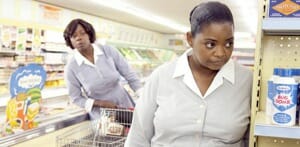The Help review

There’s a particularly powerful moment in The Help, the film about black maids and the white women they work for, set in Jackson, Mississippi in the early 1960s. On her way home from work, the maid Aibileen Clark (Viola Davis) learns from the bus driver that civil-rights activist Medgar Evers has been shot. The driver tells the black folks to get off the bus amidst distant sounds of angry voices and blaring sirens. As she walks home this gentle, kindly, poised woman is suddenly gripped with a blinding fear and panic. She begins to run, trips and falls, bloodying herself, and runs again into the safety of a friend’s home. It’s one of the few times in this mostly comical film where the danger of being black in the ’60s South is clearly palpable. But The Help has plenty of danger just beneath the surface of its prevalent humor. It’s a film that appears much lighter than it actually is.
-

-

-

-

-

-

-

-

-

-

-

-

-

-

-

-

-

-

-

-

-

-

-

-

-

-

-

-

-

-

-

-

-

-

-

-

-

-

-

-








































